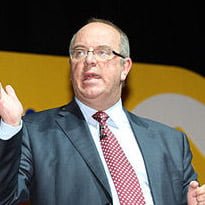Nicholson wants big conversation on NHS
- 7 June 2013

NHS England is to lead on the creation of a strategy for the health service that will try to build consensus about its future and protect it from political turmoil.
In his final speech to the NHS Confederation’s annual conference, NHS England’s chief executive Sir David Nicholson said getting a strategy in place would be one of the main jobs of his last ten months in charge of the organisation.
Sir David announced recently that he was going to retire after 35 years in the NHS and seven years in the top job in the NHS under successive governments.
He told the conference that he was leaving because he had “become the story” following the second of Robert Francis QC’s inquiries into the scandal at Mid Staffordshire NHS Foundation Trust, which he oversaw briefly as a strategic health authority chief executive.
He also told his audience in Liverpool that the NHS needed to make fundamental changes to cope with flat funding and rising costs and demand, but this was difficult given the press coverage it attracts and the short term imperatives of the electoral timetable.
He argued a strategy would help the NHS to overcome these issues, by “making the case for change” and setting out “what the NHS of the future should look like.” He called for a “big conversation” with staff, patients and communities on both.
At a BT fringe session, NHS Confederation chief executive Mike Farrar, who used his own speech to the conference to make a similar call for a new strategy, said it should put IT at its heart. “If we are to have a new strategy, then technology needs to be in it from the off,” he said.
In the same session, Farrar argued that not adopting IT, when it could be shown to have significant patient safety benefits, was “a form of neglect.” As such, he said the NHS had a “moral obligation” to deploy technology to improve care.”
In his speech, Sir David said the NHS also needed to create a new culture of care and embrace the information revolution promised by the government.
In another passage that reflected what Farrar had said the day before, he argued that the most important sections of the Francis report were those that called for transparency and “listening to patients.”
He argued giving patients more information would enable them to take more control over their own care, as well as holding the NHS to account.
He gave the example of using a blood sugar monitor to control his own diabetes which, he joked, his audience would know about because “[national director of patients and information] Tim Kelsey tweeted it.”
Sir David concluded his speech, which received a standing ovation, by saying he was determined that the NHS should not respond to the pressures facing it in the way that other health services were responding to the pressures on them – by restricting access or introducing charges.
But he warned it would have to reorganise and find ways to become more efficient instead, not least by following the example of other industries – such as banking and airlines – that have used technology to shift administrative tasks and costs to users.
“If you say to patients the options are that you get less or pay more or you do more yourselves, then I think people would go for that,” he said. “Other industries have invested in making that happen and we need to make the business case.”




